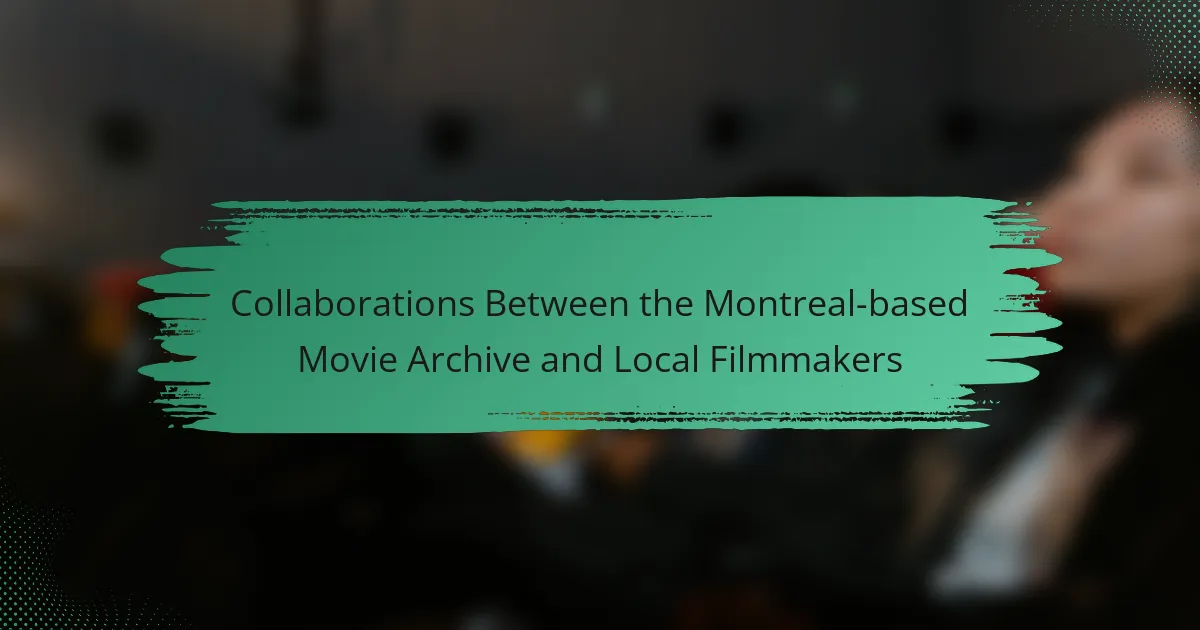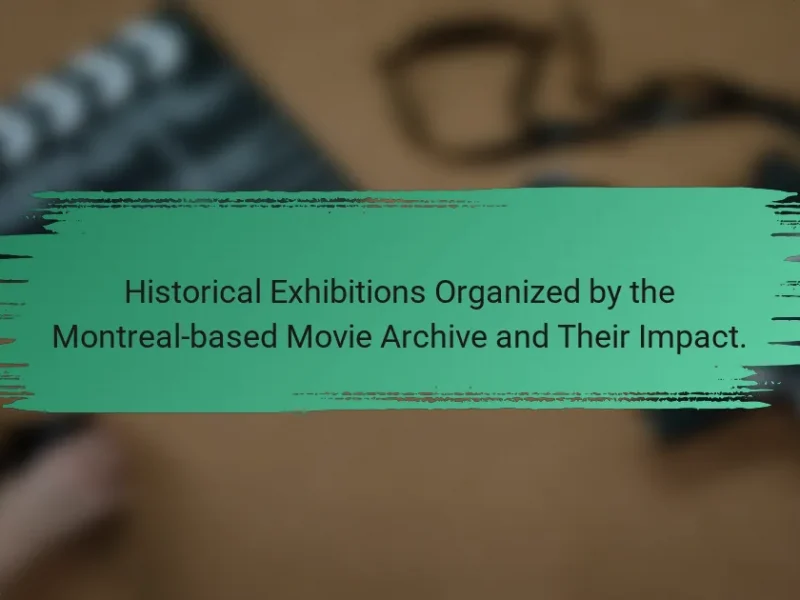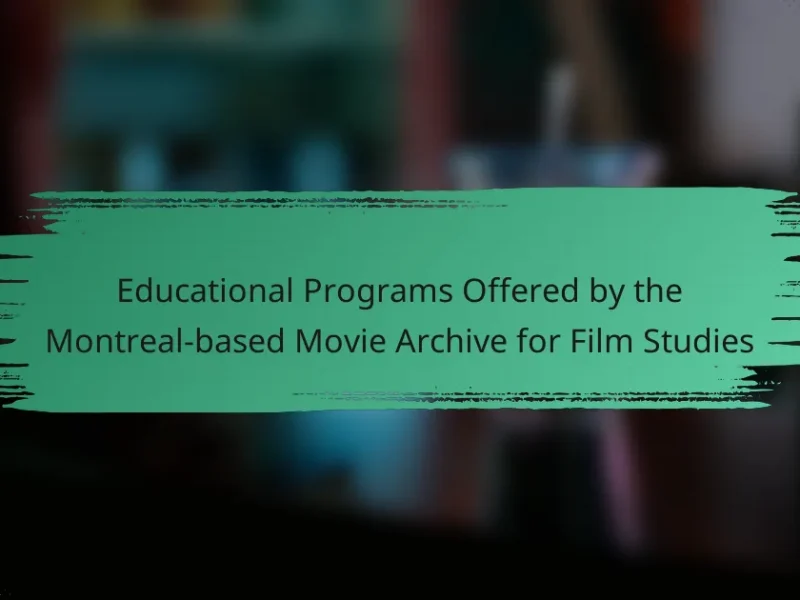The Montreal-based Movie Archive collaborates with local filmmakers to enhance the preservation and promotion of regional cinema. These partnerships focus on resource sharing, providing access to historical film collections, and offering expertise in film preservation techniques. Joint events, such as screenings and workshops, foster community engagement and support the archiving of new works by local talent. Future opportunities for collaboration include joint film projects, workshops on preservation techniques, and events like film festivals that showcase works utilizing archival materials. Overall, these collaborations strengthen the local film industry and promote the cultural heritage of Montreal.
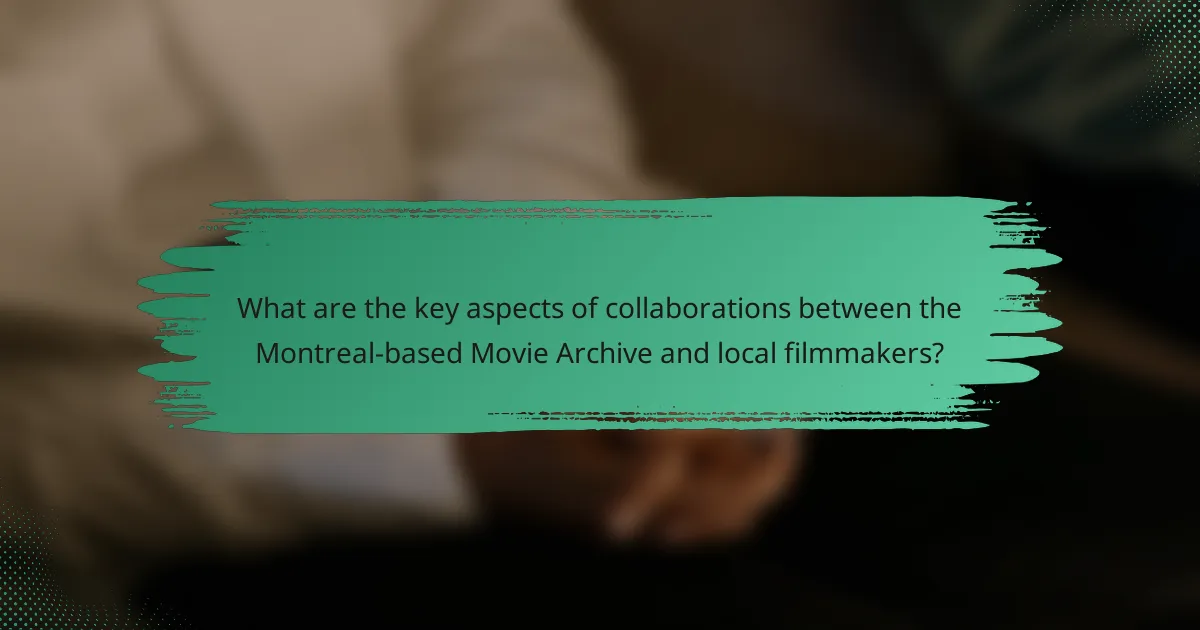
What are the key aspects of collaborations between the Montreal-based Movie Archive and local filmmakers?
Collaborations between the Montreal-based Movie Archive and local filmmakers focus on resource sharing, preservation, and promotion of local cinema. The Movie Archive provides access to historical film collections that can enhance filmmakers’ projects. Local filmmakers benefit from the Archive’s expertise in film preservation techniques. Joint events, such as screenings and workshops, foster community engagement. These collaborations also help in archiving new works by local talent. Additionally, the Archive supports filmmakers in accessing funding opportunities. This partnership strengthens the local film industry and promotes cultural heritage. Overall, these collaborations create a mutually beneficial relationship that supports both preservation and innovation in filmmaking.
How do these collaborations benefit local filmmakers?
Collaborations between the Montreal-based Movie Archive and local filmmakers provide essential resources and exposure. These partnerships often grant filmmakers access to archival footage and historical materials. This access enriches their projects and enhances storytelling. Local filmmakers can also benefit from technical support and mentorship from experienced professionals. Networking opportunities arise, connecting them with industry contacts. Collaborations can lead to funding and grant opportunities for new projects. Additionally, showcasing films through the archive increases visibility for local talent. This exposure can attract audiences and potential investors, fostering community growth in the film industry.
What resources does the Montreal-based Movie Archive provide to filmmakers?
The Montreal-based Movie Archive provides access to a vast collection of films and archival materials. Filmmakers can utilize these resources for research and inspiration. The archive also offers workshops and training sessions to enhance filmmaking skills. Additionally, it provides networking opportunities with industry professionals. Filmmakers can access technical equipment and facilities for film production. The archive supports film preservation initiatives, ensuring historical films remain accessible. These resources contribute significantly to the local filmmaking community and foster creative collaborations.
How do filmmakers utilize the archive’s collections in their projects?
Filmmakers utilize the archive’s collections to enhance their storytelling and research. They access historical footage to provide context and authenticity in their films. This archival material can include documentaries, interviews, and rare clips. Filmmakers often incorporate these elements to create a richer narrative. The collections also serve as a resource for inspiration and creative ideas. By studying past works, filmmakers can identify themes and styles relevant to their projects. Furthermore, the archive offers educational workshops that help filmmakers learn the best practices for using archival content. This collaboration fosters a deeper connection between local history and contemporary filmmaking.
What role does the Montreal-based Movie Archive play in the local film community?
The Montreal-based Movie Archive serves as a vital resource for the local film community. It preserves and showcases Canadian cinema, particularly works from Quebec filmmakers. The Archive provides access to historical films, which aids in research and education. It also hosts screenings and events that promote local talent. By collaborating with filmmakers, the Archive supports new projects and initiatives. This engagement fosters a sense of community among creators. The Archive’s collections include rare films that highlight the region’s cinematic history. Its role enhances the visibility of Montreal’s film scene on a national and international level.
How does the archive support film preservation and historical research?
The archive supports film preservation by storing and maintaining original film materials. It utilizes climate-controlled environments to prevent deterioration. This ensures that films remain accessible for future generations. The archive also digitizes films to enhance preservation efforts. Digitization allows for easier access and broader dissemination of historical content.
For historical research, the archive provides access to a vast collection of films and related documents. Researchers can study these materials to understand cultural and historical contexts. The archive often collaborates with scholars to promote film studies. This partnership enriches the research landscape by providing valuable resources.
What initiatives does the archive undertake to promote local filmmakers?
The archive promotes local filmmakers through various initiatives. It offers grants and funding opportunities specifically for local film projects. The archive also hosts workshops and training sessions to enhance filmmakers’ skills. Additionally, it provides a platform for showcasing local films to wider audiences. The archive collaborates with local film festivals to highlight regional talent. These initiatives help create a supportive ecosystem for emerging filmmakers in the community.
What challenges do local filmmakers face when collaborating with the archive?
Local filmmakers face several challenges when collaborating with the archive. Limited access to archival materials can hinder their projects. Filmmakers often encounter bureaucratic hurdles when seeking permissions. The cost of accessing certain materials may also be prohibitive. Additionally, the archive’s cataloging system can be complex and difficult to navigate. Filmmakers may struggle to find relevant content that fits their needs. Time constraints can further complicate the collaboration process. Lastly, differences in creative vision between filmmakers and archivists can lead to misunderstandings. These challenges can impact the overall success of collaborative projects.
How do funding and resource limitations impact these collaborations?
Funding and resource limitations significantly hinder collaborations between the Montreal-based Movie Archive and local filmmakers. Limited funding restricts the ability to access necessary equipment and technology. This lack of resources can lead to fewer opportunities for filmmakers to showcase their work. Additionally, insufficient funds may result in reduced marketing and distribution efforts. Consequently, collaborations can become less effective in reaching wider audiences. Studies show that financial constraints often lead to project cancellations or delays. These limitations ultimately affect the overall quality and impact of film projects.
What logistical issues arise during the collaboration process?
Logistical issues during the collaboration process include communication barriers, scheduling conflicts, and resource allocation challenges. Communication barriers can arise from differing expectations and misunderstandings between the Montreal-based Movie Archive and local filmmakers. Scheduling conflicts often occur due to varying availability of team members and project timelines. Resource allocation challenges may involve difficulties in sharing equipment or funding, impacting project execution. These issues can hinder the overall effectiveness of the collaboration and delay project completion.
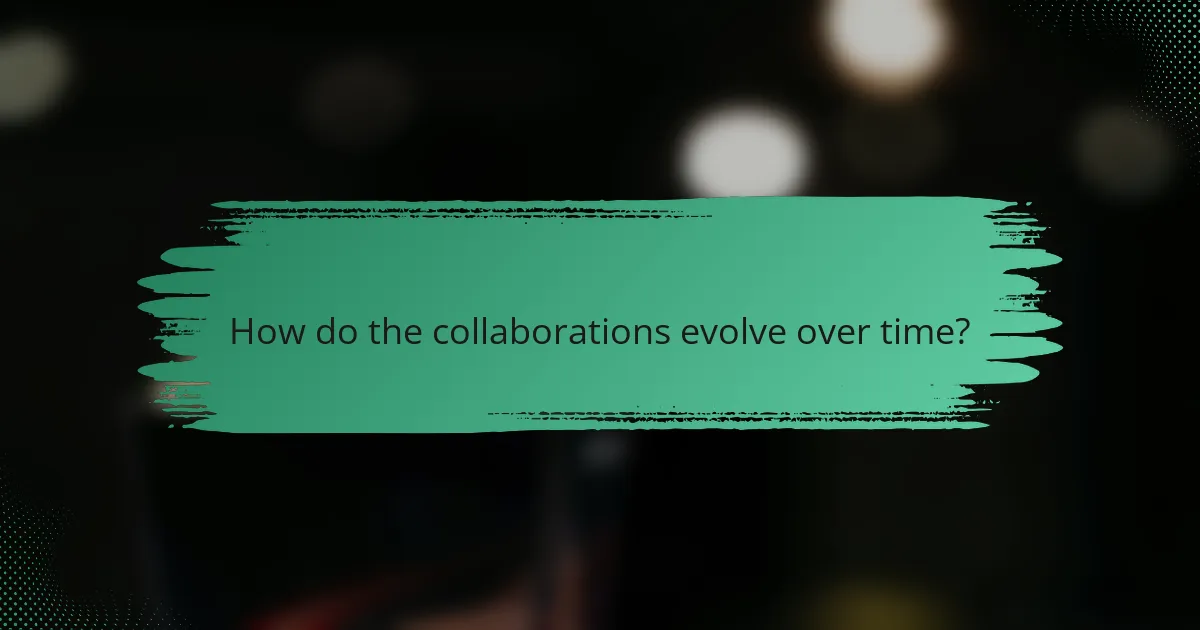
How do the collaborations evolve over time?
Collaborations between the Montreal-based Movie Archive and local filmmakers evolve through a series of stages. Initially, they begin with informal discussions and shared interests in film preservation. As relationships strengthen, these collaborations often lead to joint projects and funding opportunities. Over time, they may involve more structured partnerships, including co-productions and shared resources. Feedback from previous projects influences future collaborations, enhancing trust and communication. The evolution is also marked by adapting to technological advancements in film-making and archiving. Historical examples show that successful collaborations often result in increased visibility for local filmmakers. This dynamic fosters a vibrant film community, promoting cultural exchange and innovation.
What factors influence the development of these collaborations?
Factors influencing the development of collaborations between the Montreal-based Movie Archive and local filmmakers include shared objectives, resource availability, and mutual benefits. Shared objectives create a common ground for collaboration. Resource availability, such as funding and equipment, enhances the feasibility of projects. Mutual benefits, like increased visibility and access to archives, incentivize both parties to collaborate. Additionally, the local cultural landscape and community support can foster collaboration. Historical partnerships and networking opportunities also play a crucial role. Research by the Canadian Media Fund indicates that successful collaborations often stem from strong relationships and aligned goals.
How do changing industry trends affect partnerships with local filmmakers?
Changing industry trends significantly impact partnerships with local filmmakers. These trends can shift funding opportunities and project demands. For instance, the rise of streaming services has increased the demand for diverse content. This shift encourages local filmmakers to collaborate on unique, culturally relevant projects. Additionally, advancements in technology influence production methods and distribution channels. Filmmakers may seek partnerships to access new tools or platforms. Economic factors, such as tax incentives or grants, also shape collaboration dynamics. Local filmmakers often adapt to these trends to remain competitive. Thus, changing industry trends create both challenges and opportunities for partnerships.
What role do community events play in fostering relationships between the archive and filmmakers?
Community events play a crucial role in fostering relationships between the archive and filmmakers. These events provide a platform for collaboration and engagement. Filmmakers can showcase their work and gain visibility within the community. The archive benefits by promoting its collections and resources. Networking opportunities arise, allowing filmmakers and archive staff to connect directly. Workshops and panels at these events facilitate knowledge sharing. This exchange often leads to partnerships on future projects. Furthermore, community events enhance the cultural landscape, benefiting both the archive and local filmmakers by creating a vibrant creative ecosystem.
How can filmmakers maximize their collaboration with the Montreal-based Movie Archive?
Filmmakers can maximize their collaboration with the Montreal-based Movie Archive by actively engaging in its programs. They should participate in workshops and networking events hosted by the Archive. These events provide opportunities to connect with industry professionals and other filmmakers. Filmmakers can also access the Archive’s extensive collection for research and inspiration. Utilizing the Archive’s resources can enhance their projects’ authenticity and depth. Moreover, submitting their films for inclusion in the Archive can increase visibility. Collaborating on community screenings can foster a stronger relationship and audience engagement. Finally, filmmakers should maintain open communication with Archive staff for ongoing support and guidance.
What best practices should filmmakers follow when approaching the archive?
Filmmakers should conduct thorough research before approaching the archive. Understanding the archive’s collections can enhance collaboration. Filmmakers must clearly define their project needs. This clarity helps archivists assist effectively. Establishing a respectful relationship with archive staff is crucial. Good communication fosters trust and cooperation. Filmmakers should be aware of copyright and usage rights. This knowledge ensures legal compliance. Lastly, documenting all interactions with the archive is advisable. Keeping records aids in future collaborations and clarifications.
How can filmmakers effectively showcase their work through the archive’s platforms?
Filmmakers can effectively showcase their work through the archive’s platforms by utilizing digital collections and online screenings. They should submit their films to the archive for inclusion in curated collections. This increases visibility among audiences interested in local cinema. Collaborating with the archive for promotional events can also enhance exposure. Filmmakers can participate in discussions and Q&A sessions to engage viewers. Leveraging social media channels of the archive can further amplify reach. According to a study by the Canadian Film Institute, local filmmakers who engage with archives see a 30% increase in audience engagement. This demonstrates the effectiveness of using archive platforms for showcasing their work.
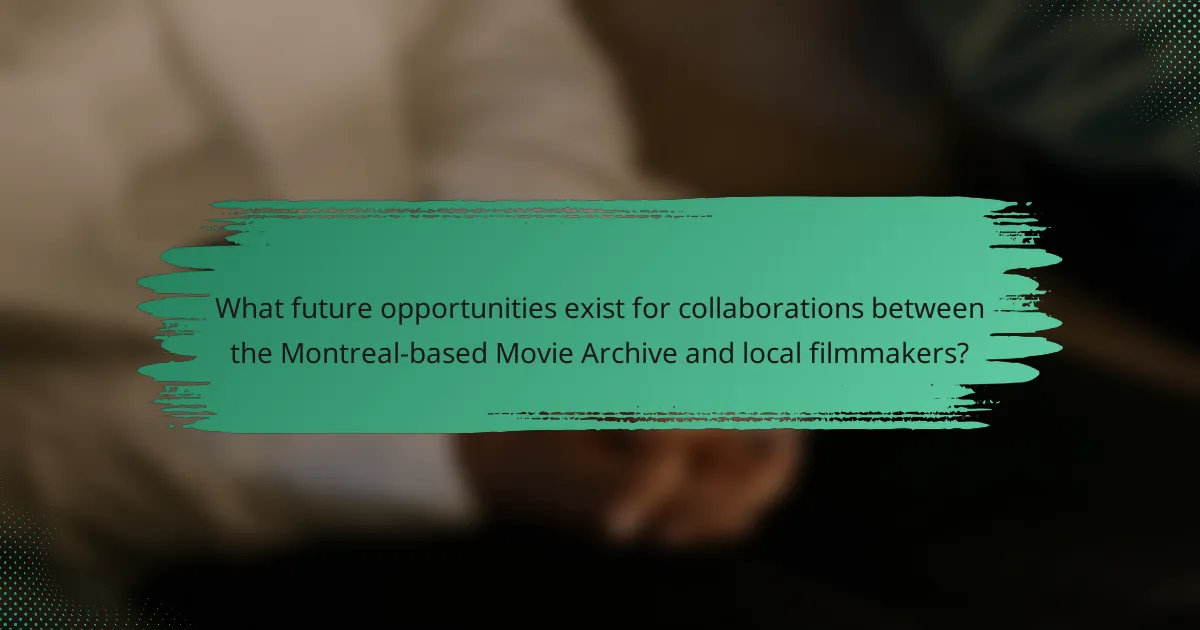
What future opportunities exist for collaborations between the Montreal-based Movie Archive and local filmmakers?
Future opportunities for collaborations between the Montreal-based Movie Archive and local filmmakers include joint film projects and archival access. The Movie Archive can provide filmmakers with historical footage and resources for their productions. Local filmmakers can create documentaries or narrative films utilizing this archival material. Workshops and training sessions can be organized to educate filmmakers about preservation techniques. Collaborative events such as film festivals can showcase works that incorporate archive materials. Additionally, the archive can support filmmakers in research and development phases. These collaborations can enhance the cultural landscape of Montreal’s film community.
How can emerging technologies shape future collaborations?
Emerging technologies can significantly shape future collaborations by enhancing communication and streamlining workflows. Technologies such as cloud computing facilitate real-time data sharing among collaborators. This leads to more efficient project management and reduces delays. Virtual and augmented reality can create immersive environments for brainstorming and creative discussions. Tools like AI can analyze vast amounts of data to provide insights that inform decision-making. Blockchain technology can ensure transparency and security in copyright and revenue-sharing agreements. These advancements promote a more collaborative atmosphere by breaking down geographical barriers. Ultimately, they foster innovation and creativity within the filmmaking community.
What innovations in filmmaking could benefit from the archive’s support?
Innovations in filmmaking that could benefit from the archive’s support include digital restoration techniques. These techniques enhance the quality of old films, making them accessible to new audiences. The archive can provide resources and expertise in preserving historical footage. Additionally, advancements in virtual reality (VR) storytelling could utilize archived content for immersive experiences. The archive’s extensive collection can serve as a foundation for creating VR narratives. Another area is the use of artificial intelligence (AI) in editing and content analysis. The archive’s data can help train AI models for better film editing tools. Furthermore, collaborative projects that integrate archival footage into contemporary narratives can foster creativity. These innovations can lead to unique storytelling methods and preserve cultural heritage.
How might audience engagement strategies evolve through these collaborations?
Audience engagement strategies may evolve through collaborations by integrating diverse storytelling techniques. Collaborations can combine archival content with contemporary narratives. This approach allows for richer, multi-layered experiences for viewers. Engaging local filmmakers can also foster community connections. These connections may enhance audience loyalty and participation. Furthermore, interactive platforms can emerge from these collaborations. Such platforms can facilitate real-time audience feedback and involvement. Enhanced audience engagement can lead to increased attendance at screenings and events. Ultimately, these strategies can create a more vibrant film culture in Montreal.
What practical tips can local filmmakers consider when collaborating with the Montreal-based Movie Archive?
Local filmmakers should prioritize clear communication when collaborating with the Montreal-based Movie Archive. Establishing open dialogue helps in understanding project expectations. Filmmakers should familiarize themselves with the Archive’s collection to identify relevant materials. This knowledge enables them to leverage historical content effectively. Additionally, filmmakers must respect copyright and licensing agreements associated with the Archive’s materials. Understanding these legal aspects ensures a smooth collaboration. Networking with Archive staff can provide valuable insights and resources. Engaging with the Archive’s community may lead to further opportunities. Finally, filmmakers should consider attending Archive events to build relationships and showcase their work.
How can filmmakers prepare for successful collaboration with the archive?
Filmmakers can prepare for successful collaboration with the archive by establishing clear communication channels. They should engage with archivists early in the project to understand available resources. Filmmakers must also specify their needs regarding footage and materials. Creating a detailed outline of the project helps archivists provide relevant content. Understanding the archive’s cataloging system is crucial for efficient searches. Filmmakers should also be aware of copyright and usage rights for materials. Building a relationship with archive staff fosters collaboration and trust. Finally, attending workshops or seminars on archival research can enhance their skills and knowledge.
What common pitfalls should filmmakers avoid in these partnerships?
Filmmakers should avoid lack of clear communication in partnerships. Misunderstandings can lead to project delays and dissatisfaction. Establishing defined roles and responsibilities is crucial. Ambiguity can cause conflicts and hinder progress. Filmmakers must also avoid underestimating the importance of contracts. Written agreements protect all parties involved. Failing to respect each other’s creative vision can result in tension. Collaboration thrives on mutual respect and understanding. Lastly, filmmakers should not overlook budget constraints. Financial mismanagement can jeopardize the entire project.
The main entity of the article is the collaboration between the Montreal-based Movie Archive and local filmmakers. This article outlines the key aspects of these partnerships, including resource sharing, preservation techniques, and community engagement initiatives that benefit both parties. It discusses the resources provided by the Archive, such as access to historical film collections and technical support, which enhance local filmmakers’ projects. Additionally, the article addresses challenges faced during collaborations, factors influencing their development, and the evolving nature of these partnerships in response to industry trends. Finally, it highlights future opportunities for innovation and audience engagement strategies that could arise from these collaborations.
